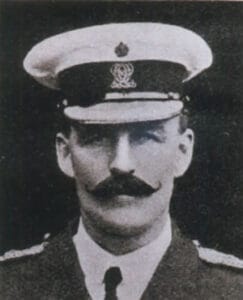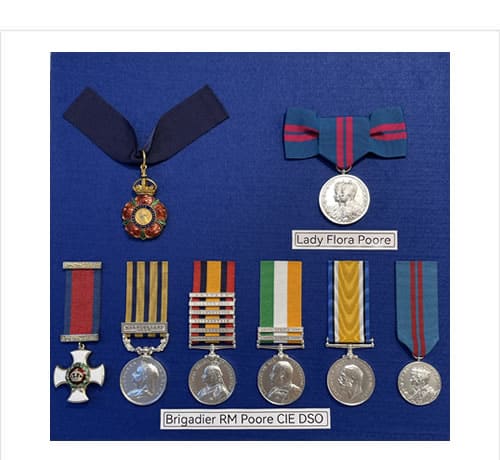Robert Montagu Poore was born at Carysfort House, near Dublin, 20 March 1860, eldest son of Major Robert Poore, late 8th Hussars, and of Juliana Benita, daughter of Rear Admiral Sir Armar Lowry Corry, KCB.

He joined the Wiltshire Regiment, as Lieutenant, from the Militia, 28 April 1886; was transferred to the 7th Hussars, as Lieutenant, 13 October 1886.
He served in India from 1886 to 1895; was ADC to His Excellency the Governor of Bombay 24 October 1892 to 17 February 1895.
He served in South Africa, 1895 to 1905, including the Matabele (1896) and Mashonaland (1897) Campaigns.
He was mentioned in Despatches [London Gazette, 18 February 1898], and was given the Brevet of Major 20 May 1898, having been promoted to Captain 1 July 1896.
He served in the South African War, 1899-1902, with the Military Mounted Police 9 October to 12 November 1899; as Provost-Marshal 13 November 1899 to 7 July 1902, being present at the operations in the Orange Free State, February to May 1900, including operations at Paardeberg (17 to 26 February); actions at Poplar Grove, Dreifontein, Vet River (5 and 6 May) and Zand River; operations in the Transvaal in May and June 1900, including actions near Johannesburg, Pretoria and Diamond Hill (11 and 12 June); operations in the Transvaal, east of Pretoria, July to 29 November 1900, including action at Belfast (26 and 27 August); operations in the Transvaal 30 November 1900 to 31 May 1902.
He was mentioned in Despatches [London Gazette, 8 February and 16 April 1901]; received the Queen’s Medal with six clasps; the King’s Medal with two clasps and was created a Companion of the Distinguished Service Order [London Gazette, 19 April 1901]: “Robert Montagu Poore, Captain and Brevet Major, 7th Hussars. In recognition of services during the recent operations in South Africa”.
The Insignia were presented by the Duke of Cornwall and York 14 August 1901.
He became Major 17 July 1901, and Lieutenant Colonel 26 June 1911. He commanded the 7th Hussars, 1911-15. He served in the European War from 1914; was promoted to Colonel 15 December 1914, and Temporary Brigadier General 14 October 1915; commanded the Jhansi Brigade (India), 1915-19; was mentioned in Despatches, and created a CIE in the Birthday Honours, 1918.
He played cricket for the Bombay Presidency (India), 1892-95 and 1912-13, and for South Africa against Lord Hawke’s English team during the winter of 1897-98, scoring two centuries.
He was kept out of English first-class cricket till he was in his thirty-third year, owing to his regiment being on foreign service in India and South Africa.
1899 was his best year.
He headed the season’s batting in first-class matches, scoring 1,551 runs for 21 innings, his average working out to 91.23, which has never been equalled in first-class cricket for so large a number of runs. For Hampshire his average was 116.58. A partnership with Captain E G Wynyard produced 411 runs before they were parted. He played for the Gentlemen v Players in 1899.
He did not limit his activities to the game of cricket. He was one of the finest swordsmen in the Army, being Best Man-at-Arms (Mounted events) for four consecutive years in which he competed at the Royal Naval and Military Tournament (1898, 1899, 1906, 1907).
He was a first-class polo player, and played ‘back’ for his regimental team, taking part in several successful Inter-Regimental tournaments in India and finally in 1899 at Hurlingham.
In 1899 he had a phenomenal fortnight, in which he played in the winning team (7th Hussars) in the Inter-Regimental Polo Tournament, when he hit the winning goal; was Best Man-at-Arms at the Royal Naval and Military Tournament and scored three successive centuries for his county in first-class cricket.
He has won several racquet, squash racquet and lawn tennis tournaments, and was a good shot both with the rifle and gun.
He married, in 1898, Lady Flora Douglas-Hamilton, sister of the 13th Duke of Hamilton.


